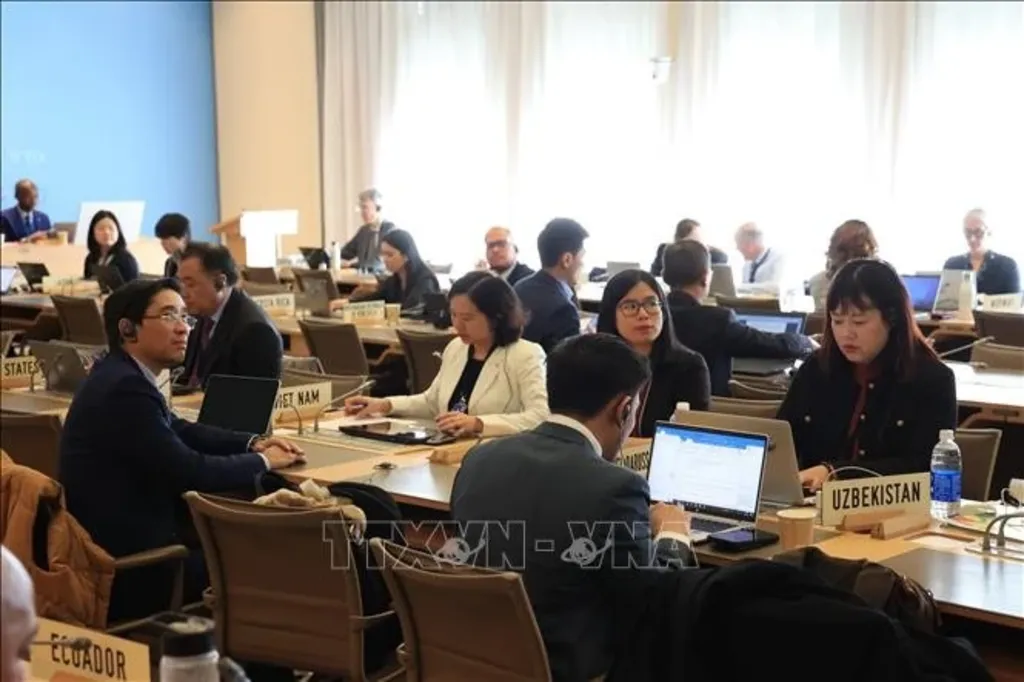 |
| The Vietnamese delegation at the recent regular meeting of the World Trade Organization (WTO) Committee on Rules of Origin__Photo: VNA |
Vietnam has shared its practical experience in applying rules of origin for export goods at a recent regular meeting of the World Trade Organization (WTO) Committee on Rules of Origin, held at its headquarters in Geneva, Switzerland.
Trinh Thi Thu Hien, Deputy Director of the Agency of Foreign Trade under the Ministry of Industry and Trade, updated WTO members on how Vietnam implements rules of origin for goods exported to member countries.
In an interview with the Vietnam News Agency (VNA) on the sidelines of the event, Hien provided further insights into the importance of rules of origin and how they are applied in Vietnam.
According to Article 3(b) of the WTO Agreement on Rules of Origin, a product is considered to originate in a country if it is wholly produced there, or if multiple countries are involved in its production, the origin is assigned to the country where the last substantial processing takes place. This principle is also reflected in Clause 1, Article 3 of Vietnam’s Decree 31/2018/ND-CP issued on March 8, 2018.
Hien explained that rules of origin are a set of criteria used to determine the country where a product is manufactured (i.e. country of origin). These rules are especially important for goods produced using inputs from multiple countries, and require clearly defined methods and standards to identify the origin accurately.
Under WTO and free trade agreement (FTA) frameworks, goods are generally classified into two categories: (i) Wholly obtained goods, such as unprocessed agricultural products grown, harvested, or raised entirely within a country. For example, coffee beans grown and harvested in Vietnam are considered of wholly Vietnamese origin; (ii) Non-wholly obtained goods, which are produced using both domestic and imported inputs. For instance, passion fruit juice made from Vietnamese fruits and sugar but containing imported preservatives can still qualify as Vietnamese origin, though not wholly obtained.
Hien emphasized that determining the correct origin of goods is critical in formulating and implementing trade policies, as it forms the basis for applying preferential tariffs and trade measures under various agreements. Proper certification allows goods to benefit from trade regimes such as WTO-bound tariffs, the Generalised System of Preferences (GSP), or preferential tariffs under FTAs.
Conversely, if goods do not meet the origin requirements, rules of origin can be used to deny access to those preferential regimes.
Hien also pointed out a common misunderstanding: the term “origin” is not interchangeable with the label “Made in Vietnam.” For example, clothing labeled “Made in Vietnam” might not have a Vietnamese Certificate of Origin (C/O), and vice versa — a shipment with a Vietnamese C/O might not carry the “Made in Vietnam” label.
On managing origin amid increasing global integration, Hien said the Agency of Foreign Trade has taken synchronous measure. Key efforts include improving the legal framework with a strong focus on tackling origin fraud, enhancing training for authorized C/O issuing organizations, and cooperating with authorities in importing countries on origin verification to ensure that legitimate Vietnamese exports receive appropriate tariff preferences.
In addition, the Ministry of Industry and Trade is actively involved in negotiating rules of origin aligned with Vietnam’s production capabilities, reforming administrative procedures, digitalising the C/O application process, and enhancing support services for businesses seeking clarification on origin-related matters.
The Vietnamese official expressed his appreciation for the support of the US Congress and the senators for the Vietnam–US relationship.
Phoc expressed his delight at the positive developments in bilateral ties following the establishment of the Comprehensive Strategic Partnership, stressing the significance of the year 2025 that marks the 30th anniversary of the normalization of relations between the two countries.
Regarding bilateral economic and trade relations, the Deputy PM noted that the Vietnam–US relationship is complementary in nature, explaining Vietnam does not compete with the US in its key exports, while importing a wide range of US goods, services and high-tech products.
He called on the US Congress to continue its support and advocacy for the removal of tariff measures on Vietnamese goods. He also urged support for the two countries to engage in negotiations to soon reach a long-term, sustainable bilateral trade agreement that serves the interests of both nations’ people and businesses.
The two senators expressed their hope that the bilateral relationship will continue to grow and make positive contributions to peace and stability in the region and the world at large.
They commended Vietnam for its proactive approach in addressing tariff-related issues with the US and affirmed their support for Vietnam–US trade relations based on the broader strategic interests shared between the two countries.
Both expressed confidence that the two countries will soon kick-start the negotiation process and find solutions to strengthen a stable and mutually beneficial economic and trade relationship in the near future.
While in the US, Phoc also held meetings with many experts, scholars, and major businesses from both the US and Vietnam, and witnessed the signing ceremony of a Memorandum of Understanding on cooperation between Vietnam’s Vietjet and Air Finance of the US.- (VNA/VLLF)









